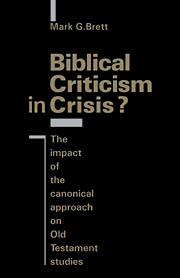Book contents
- Frontmatter
- Contents
- Acknowledgements
- List of abbreviations
- Introduction: Setting the scene
- 1 Distinguishing interpretative interests
- 2 The development of canonical exegesis
- 3 ‘Introduction’ and Old Testament theology
- 4 Has Childs fallen into Gabler's ditch?
- 5 Textual intentions and histories of reception
- 6 The future of the canonical approach
- Notes
- Bibliography
- Bibliographical key to the works of Brevard S. Childs
- Index of Old Testament references
- Index of subjects
- Index of authors
4 - Has Childs fallen into Gabler's ditch?
Published online by Cambridge University Press: 10 October 2009
- Frontmatter
- Contents
- Acknowledgements
- List of abbreviations
- Introduction: Setting the scene
- 1 Distinguishing interpretative interests
- 2 The development of canonical exegesis
- 3 ‘Introduction’ and Old Testament theology
- 4 Has Childs fallen into Gabler's ditch?
- 5 Textual intentions and histories of reception
- 6 The future of the canonical approach
- Notes
- Bibliography
- Bibliographical key to the works of Brevard S. Childs
- Index of Old Testament references
- Index of subjects
- Index of authors
Summary
HISTORICAL PARTICULARITY AND BIBLICAL AUTHORITY
The purpose of this chapter is to examine one type of objection which has been raised against the canonical approach: Childs, it is often said, fails to take ‘historical particularity’ seriously enough. As we have already pointed out, it is especially the treatment of Second Isaiah in the Introduction to the Old Testament as Scripture which has incensed reviewers. Bernhard Anderson is representative of this response when he claims that the
transhistorical quality of the biblical material did not eclipse the anchorage of the texts in real life with its concrete particularity and historical referents … the message of the prophet, and hence the meaning for future generations, is essentially related to that historical situation into which the prophet spoke Yahweh's word of consolation and hope.
Anderson is, of course, referring to the historical situation of the Babylonian exile and arguing that Second Isaiah must be seen against that background of authorship.
One must ask Anderson to specify, however, exactly which ‘future generations’ read Isaiah 40–55 as exilic prophecy? Surely this original background was quickly forgotten. Our understanding of ancient Israelite prophecy is quite different to the Jewish perceptions of prophecy from the Persian period onwards. In other words, the origins of Second Isaiah were indeed swiftly eclipsed and did not play a decisive role in the meaning of the text for future generations. However, other critics have put the objection concerning particularity less ambiguously than Anderson.
- Type
- Chapter
- Information
- Biblical Criticism in Crisis?The Impact of the Canonical Approach on Old Testament Studies, pp. 76 - 115Publisher: Cambridge University PressPrint publication year: 1991



